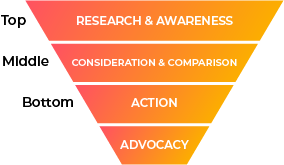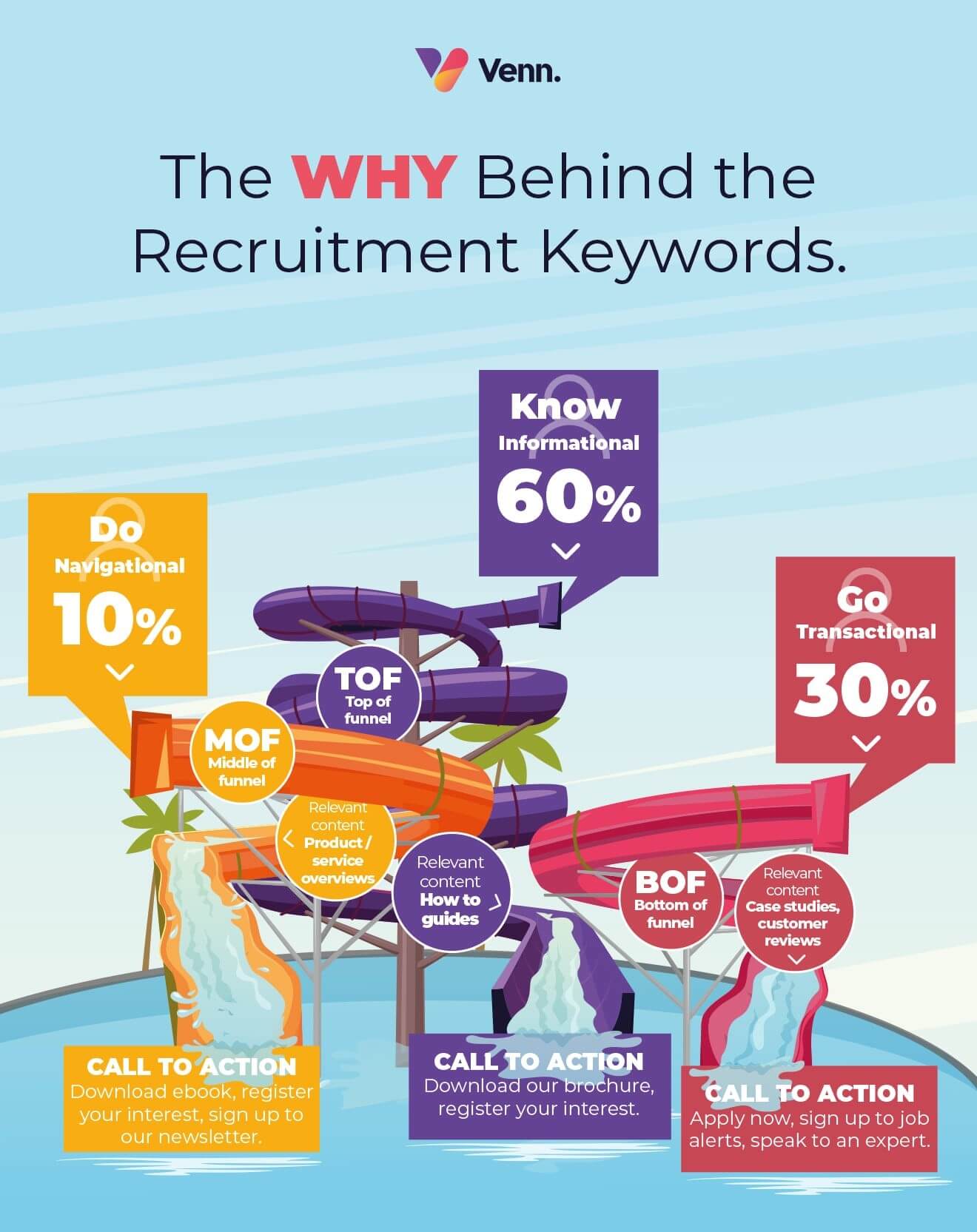Explore our NEW Knowledge Base and Help Desk to find everything you need to attract, engage and convert talent with your Vennture website.
Discover MoreUnderstanding Search Intent in Recruitment Marketing
17 May, 20224 minutes
For any keyword, there are potentially many variations of search terms and intentions, depending on the purpose of the search and where the user is on their buyer journey.
Search intent plays a key role in our SEO and content marketing strategies as it helps us best understand how people are searching and provide effective content at each phase of the marketing funnel. Whether it be candidate or client attraction, we have developed many strategies that help recruitment brands optimise for search intent to improve their online visibility.
Understanding search intent takes years of practice, learning and trial and error. We don’t expect to make you experts with one blog alone. However, we do want to give you an introduction to get you thinking about the role of search intent in your recruitment marketing strategy. Take 10 minutes to explore the fundamentals of search intent in SEO.
What is search intent, and why does it matter?
The definition of search intent is the consumer's intent or real meaning behind search engine searches. – The why of the keywords. Search intent is fundamental within SEO and content marketing as it enables us to fully understand what stage of the purchasing/converting funnel the user is on.

By understanding search intent, you can create content to support customers on their journey to conversion. From a marketing perspective, it matters as we can quickly establish the pain points in the user search journey. We can also identify gaps in the existing content and optimise to ensure that we can aid the user on their journey to conversion.
At Venn, we classify search intent into three core areas;
1. Informational Search - Informational queries have no accurate indicator to a specific brand or price, so we usually class these as users at the start of the funnel. These users are most likely just browsing for more information.
e.g. Trainers for running.
2. Navigational Search - This is a search query where a user has a specific brand in mind, so they are searching for a product/service along with a brand keyword in the same search query.
e.g. Nike trainers.
3. Transactional Search - Transactional intent occurs when users are at the bottom of the funnel and are looking directly for sale/price-related information. For example, someone looking for a job is a transaction based search as they want to convert.
e.g. Running trainer's prices.
How can you use keyword research to understand search intent?
There are potentially many different search intentions for any keyword to find varying types of content. Search queries can come in the form of longtail and short keyword search intent and informational, navigational and transactional search intent.
The more granular a user’s search intent is, the further along the purchasing funnel they are moving. To understand this, we need to conduct keyword research, making it easier for us to create targeted content to capture that search demand. From this, we can determine whether that’s for Informational, Navigational or Transactional search demand.
Using keywords to understand user intent does require a lot of practice. Whilst SEO experts can know just by looking at a keyword; others need to take a more methodical approach to begin with. We take a categorisation approach to keyword research, considering the market and device breakdown, giving us a clear indication of user search intent segmentation.
How can recruitment agencies optimise for search intent?
Recruitment agency brands have an opportunity to optimise their website content and create a future content strategy that harnesses the user intent research of their target audience. First, you must understand the search landscape, which can be achieved by completing keyword research and clustering themes/topics into categorisations. Then, whether you do this in-house or with the help of an SEO expert, you can optimise your site accordingly with regard to how the user is searching.
Working with an SEO specialist, you’ll be able to research your target audience and use keyword analysis to identify how they are searching online. By doing this, you’ll be able to break down your target keywords by category (Navigational, Informational & Transactional) and identify the type of query they are using, the search volume behind it and relevant content and CTAs that would allow you to plan your content strategy accordingly.
Buyer journey/Search intent/Content-type.
The infographic below shows how the buyer journey stages relate to different types of search intent and how recruitment content can be produced to target each customer.
Look at what you’re competitors are doing and identify what form of content performs best; maybe it’s how-to guides, video tutorials or service details. With this information, you can not only create a plan for optimising existing content but also build a content strategy that builds on these popular forms of content and keyword opportunities.

Every strategy we design is built on a deep understanding of your audience and potential customers. We can identify how your users are searching and what content you can produce to reach them at the right time. Our team of content marketing and SEO specialists are highly experienced within the recruitment industry and work hard to stay up to date with the latest trends and tactics. If you would like to learn more about our recruitment marketing and SEO approach, speak to an expert today or explore some of our client success stories.



